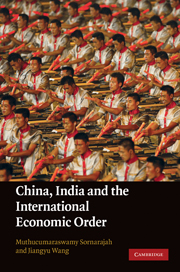Book contents
- Frontmatter
- Contents
- Notes on contributors
- Preface
- Introduction and overview
- PART I China, India and the global trade system
- 1 The WTO and development policy in China and India
- 2 China, India and developing countries in the WTO
- 3 China–India cooperation, South–South coalition and the new international economic order
- 4 India, China and foreign investment
- 5 China, India and WTO Law
- 6 China, India and the WTO dispute settlement system
- 7 China, India and dispute settlement in the WTO and RTAs
- 8 China, India and global outsourcing of services under GATS
- 9 International dispute settlement
- PART II China, India and regional economic integration in Asia
- PART III Law and development in China and India: Domestic issues
- Index
- References
3 - China–India cooperation, South–South coalition and the new international economic order
Focus on the Doha Round
from PART I - China, India and the global trade system
Published online by Cambridge University Press: 03 May 2011
- Frontmatter
- Contents
- Notes on contributors
- Preface
- Introduction and overview
- PART I China, India and the global trade system
- 1 The WTO and development policy in China and India
- 2 China, India and developing countries in the WTO
- 3 China–India cooperation, South–South coalition and the new international economic order
- 4 India, China and foreign investment
- 5 China, India and WTO Law
- 6 China, India and the WTO dispute settlement system
- 7 China, India and dispute settlement in the WTO and RTAs
- 8 China, India and global outsourcing of services under GATS
- 9 International dispute settlement
- PART II China, India and regional economic integration in Asia
- PART III Law and development in China and India: Domestic issues
- Index
- References
Summary
Introduction
International economic order means the comparatively steady pattern, structure or model of international economic relations gradually formed in a specific history era. The establishment and evolution of the international economic order depends on the comparative economic, political and military power among categories of members in international society. International economic order is closely related to international economic law. International economic law is a fundamental tool to strengthen existing international economic order, and at the same time, an important means to promote and change the old international economic order and establish the new international economic order.
The development process of international economy and international economic law witnesses the continuous struggles between strong countries who are trying to maintain and enlarge their vested interests and to defend the old international economic order, and the weak countries who are striving to ensure a status of economic equality and to establish a new international economic order. These struggles are generally resolved with compromise and cooperation between the two parties. However, after a period of compromise and cooperation, new struggles arise from new interest contradictions and conflicts. This is a recurring cycle, with each recurrence raising the existing international economic order and related international economic norms to a new level or new phase.
- Type
- Chapter
- Information
- China, India and the International Economic Order , pp. 92 - 131Publisher: Cambridge University PressPrint publication year: 2010
References
- 1
- Cited by



